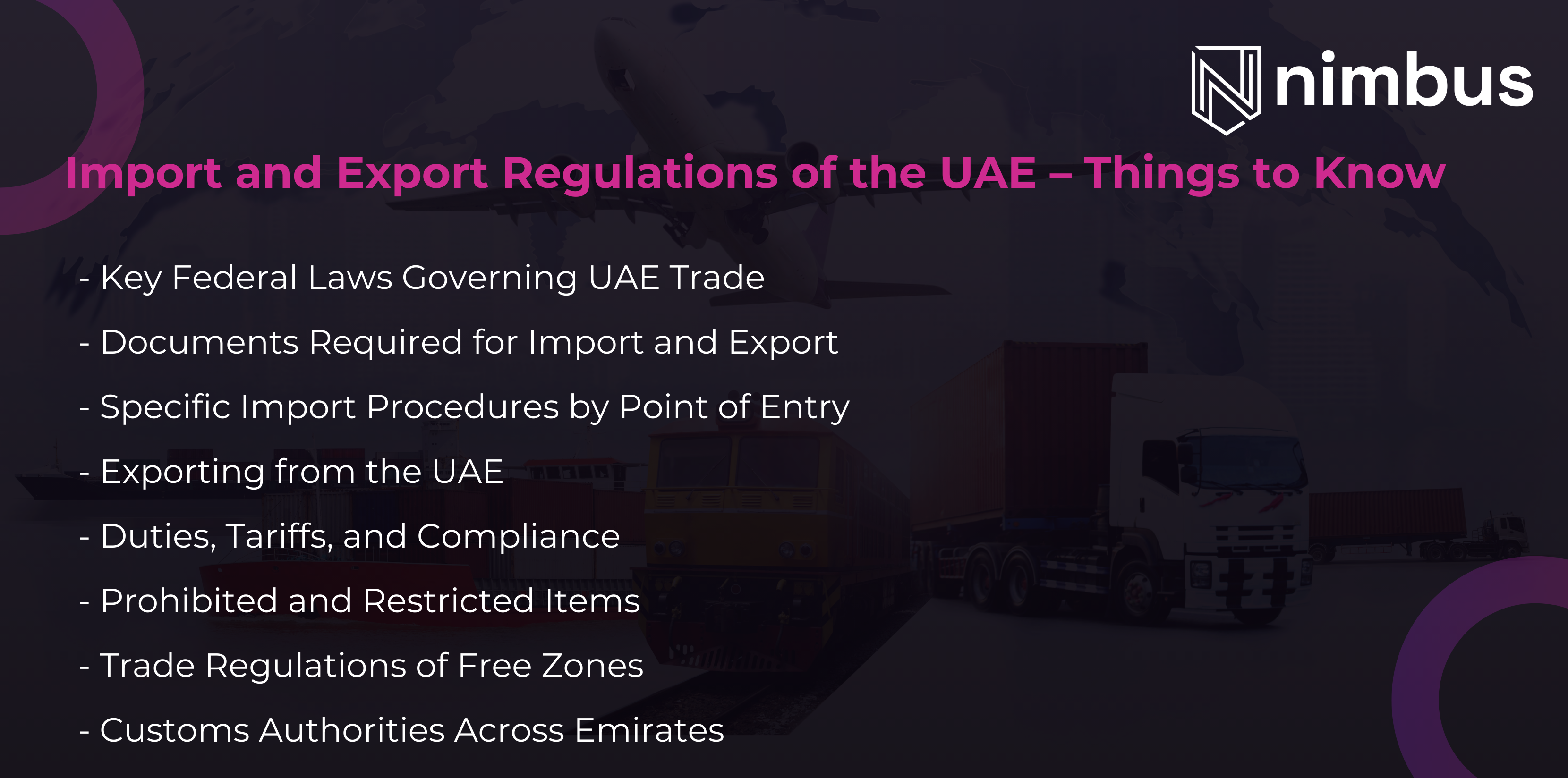The United Arab Emirates continues to play a vital role in global trade, acting as a bridge between East and West with unmatched logistics infrastructure, favorable regulations, and access to growing international markets.
As global trade steadily recovers, up by 2.3 percent in the first half of 2024, the UAE is leading the Middle East in trade growth. For companies involved in the import or export of goods, understanding the legal, procedural, and operational frameworks of UAE trade is critical.
Whether you’re trading through the mainland, one of the many free zones, or via air, sea, or road, compliance is key to ensuring efficiency and avoiding delays or penalties.
This post gives investors an updated and practical overview of the UAE’s import and export system, with everything you need to know in 2025.
Import and Export Regulations of the UAE – Things to Know

– Key Federal Laws Governing UAE Trade
The UAE’s legal framework promotes operational efficiency, commercial transparency, and international compliance:
- Federal Law No. 12 of 2013: Establishes the Federal Customs Authority and unified customs procedures.
- Common Customs Law of the GCC: Harmonizes customs practices across Gulf Cooperation Council countries and introduces a common tariff.
- Federal Law No. 8 of 1980: Sets rules for commercial transactions and business agreements.
- Federal Law No. 18 of 1981: Regulates commercial agency relationships, ensuring transparency in dealings with international suppliers.
- Federal Law No. 7 of 2017: Protects consumer rights regarding the safety and quality of imported products.
Understanding these laws is essential for smooth customs clearance, legal compliance, and building trust in international trade partnerships.
– Documents Required for Import and Export
For Mainland Imports
- Original Bill of Lading: Lists shipment details and delivery terms.
- Commercial Invoice: Required for customs valuation and duty calculation.
- Packing List: Contains item descriptions, quantities, and packaging methods.
- Certificate of Origin: Confirms the source country for duty and compliance purposes.
- Import Permit: Required for restricted or duty-exempted goods.
- Customs Import Declaration: Submitted to customs authorities before goods are released.
For Free Zone Imports
- Delivery Order from Shipping Agent
- Approval from Free Zone Authority
- Transport Documents: Bill of Lading, Airway Bill, or Road Manifest
- Import Permit for Regulated Goods
- Commercial Invoice and Detailed Packing List with HS Codes
- Import Goods Declaration Form
Why Proper Documentation Matters?
- Ensures quicker customs clearance.
- Minimizes risks of penalties or delays.
- Streamlines operations and reduces logistical costs.
- Required for audits and regulatory compliance.
Note that documentation requirements vary across free zones, and individual zones may enforce their own customs processes.
– Specific Import Procedures by Point of Entry
- Sea Imports: Bill of Lading, Invoice, Packing List, and Certificate of Origin.
- Air Imports: Air Waybill, Commercial Invoice, Packing List, and Certificate of Origin.
- Road Imports: Commercial Invoice, Certificate of Origin, and Packing List.
– Best Practices for Importers
- Classify goods accurately using Harmonized System (HS) codes.
- Check for pre-shipment inspection requirements.
- Ensure all permits and licenses are obtained in advance.
- Hire customs clearance agents for smoother entry.
- Stay informed on updates from customs authorities and regulatory bodies.
– Exporting from the UAE
Exporting begins with booking the shipment through a shipping agent, who oversees container allocation and logistics. Exporters must submit an Export Declaration that includes cargo details and invoice information. Depending on the type of goods and destination country, additional permits or certificates may be required.
– Duties, Tariffs, and Compliance
The standard UAE customs duty is 5 percent, calculated on the total value of goods including freight and insurance. However, specific goods such as alcohol and cigarettes are taxed at higher rates. Businesses must ensure accurate customs valuation and classification to avoid fines.
– Prohibited and Restricted Items
Prohibited imports and exports include:
- Narcotics and controlled substances
- Counterfeit goods
- Gambling tools
- Media conflicting with Islamic values
Restricted items may be allowed with the appropriate permissions:
- Live animals, fertilizers, and pesticides:Require clearance from the Ministry of Climate Change and Environment.
- Weapons and explosives:Require Ministry of Defence authorization.
- Pharmaceuticals and medical equipment:Require Ministry of Health and Prevention approvals.
– Trade Regulations of Free Zones
The UAE has more than 40 free zones and each free zone has its own regulations regarding import and export operations, so it’s crucial to understand the specific requirements of the zone where your business operates.
– Customs Authorities Across Emirates
Businesses must engage with the appropriate customs authority based on their location:
- Dubai Customs
- Abu Dhabi Customs
- Sharjah Customs
- Ajman, Ras Al Khaimah, Fujairah Customs
Staying Compliant and Competitive for Business Setup in the UAE
With rising trade volumes and strategic initiatives, the UAE continues to be a top choice for importers and exporters alike. However, success in this demands a solid understanding of trade laws, documentation, and customs processes.
Businesses that stay informed, follow regulatory changes, and work with the right advisors will benefit from a compliant company formation in the UAE with smoother customs operations, better market access, and long-term profitability.
If you’re planning to expand your trading operations in the UAE or need help navigating customs procedures, working with experienced consultants ensures full compliance and efficient execution every step of the way.



